Advertisement
Homeless Displaced By Long Island Bridge Closure Remain In Flux
Resume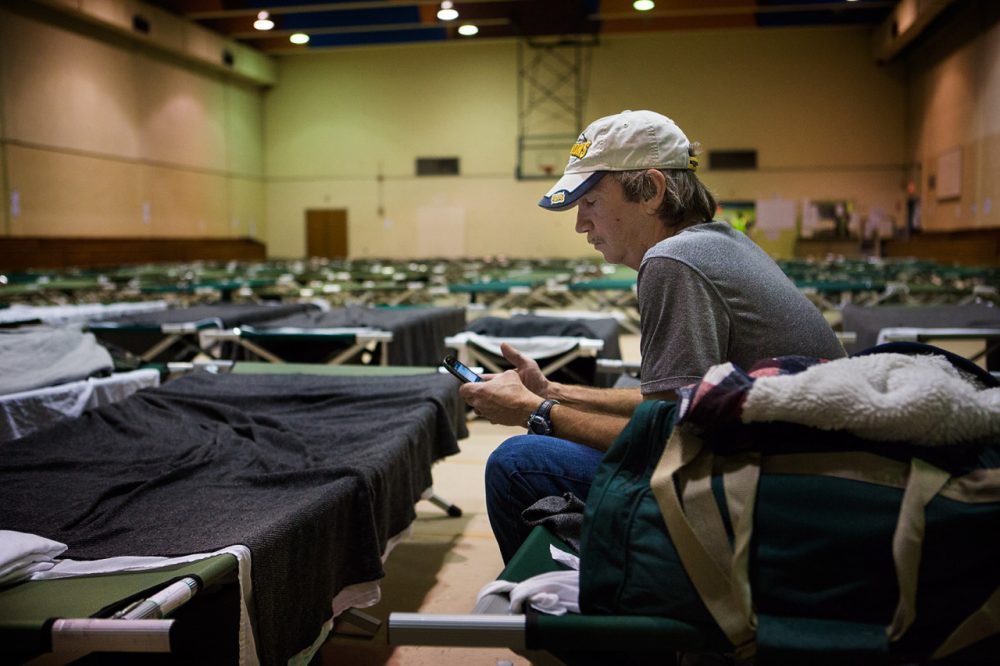
The hundreds of homeless people who were displaced from shelters on Long Island are still being housed in makeshift shelters more than two months after the only bridge to the island was closed due to safety concerns.
Dozens of women who have been spending their nights at the Barbara McInnis House in the South End are adjusting to things such as walking to the bathroom with an escort and sometimes having to scramble — not for a bed, but a cot.
"You're, like, hustling," said 44-year-old Emma, who says she had to give up her son after losing her home and is now searching for a job. She didn't want her last name used. "You know how people hustle for dope? You're hustling to, like, literally [find] somewhere to sleep."
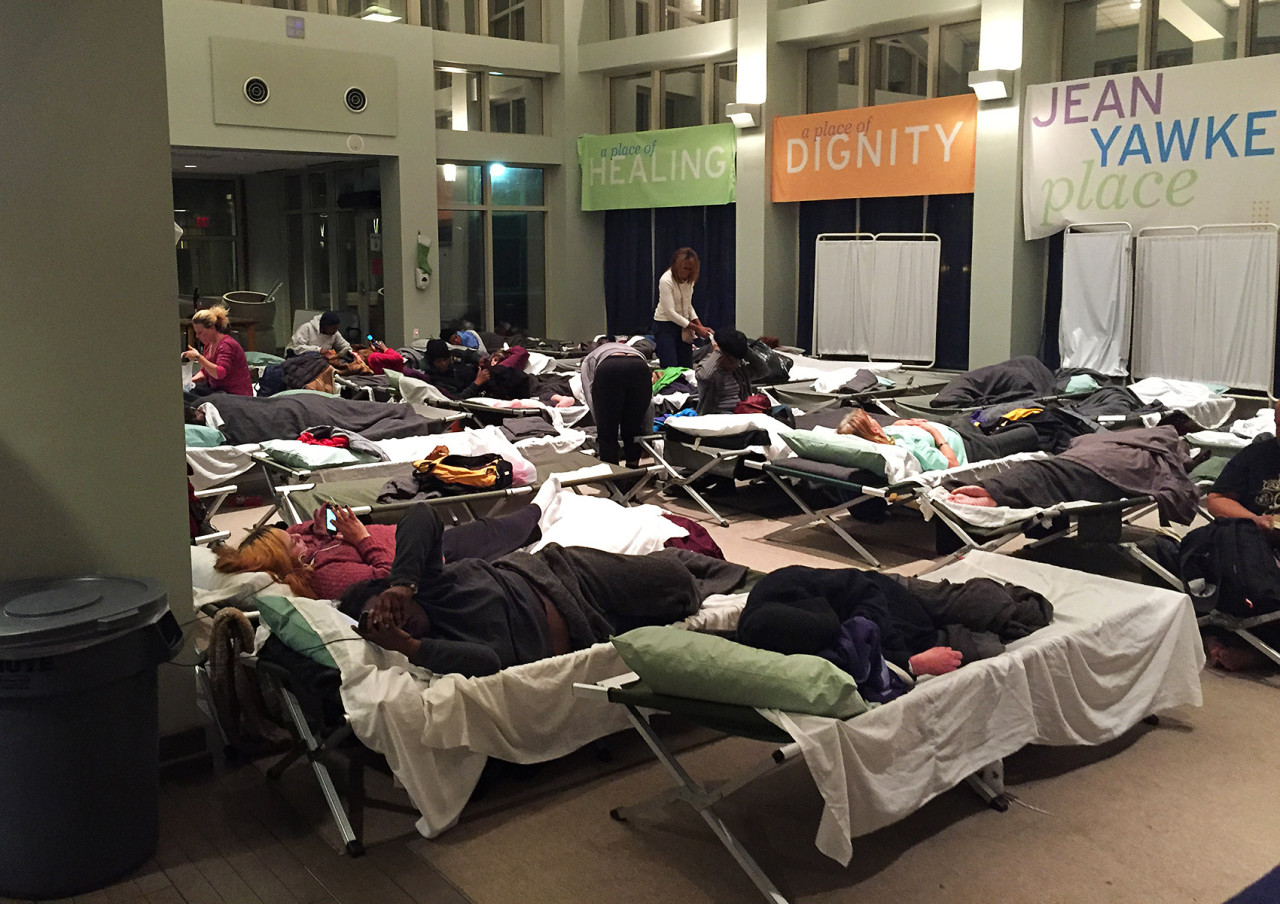
Emma is among about four dozen women sleeping in the atrium of the Boston Health Care for the Homeless respite facility. The women come at night and have to be out by 6 a.m. -- when the nonprofit's medical center opens. Then they go look for places to eat and wash up.
"Today, for instance, I went to Women's Lunch [Place], I showered, did my laundry, then made some phone calls, they gave me winter coat," Emma explained. "Then after that I had some more appointments to do medical, and then I came here for dinner at Rosie's [Place]."
Emma actually prefers this atrium to the shelter Long Island. There, she said, she often didn't feel safe.
But another client, Lizette Muniz, said she's had trouble with some of the other women here.
"They steal my stuff. This morning I had to make some police report," Muniz said. "They threaten me to have my face sliced, you know? I don't even know why, what's the reason."
The atrium has large windows, which are blocked with white fabric partitions like you'd see in a hospital. Just about every spot of floor space is taken up by a military-style cot.
"I think, you know, it's really unfortunate that this has been going on for the last two months," said Pooja Bahlla, the COO of Boston Health Care for the Homeless. While Bahlla said she understands Boston Mayor Marty Walsh had to close the Long Island bridge for safety reasons, and she's pleased renovation work will start next month on a new shelter, she's concerned about both the immediate and long-term impact of the crisis.
"This is not OK that we have all these women here every night in tight quarters, going into the flu season," Bahlla said. She added that the biggest challenge, however, is the loss of 57 percent of the city's substance abuse treatment beds, which were housed on Long Island.
Some homeless and recovery advocates have criticized Walsh for not taking quicker action to replace the treatment beds — especially since as a recovering alcoholic, he pledged to help those struggling with addiction.
But the state representative-turned-mayor defended his efforts.
"This is a very complicated situation — probably unprecedented, really," Walsh said. "And the advocates out there know pretty well, when over the last nearly two decades, when the state cut back on the funding formula, who they went to to save those programs."
Walsh added that with all the development going on in Boston, it's difficult to find space to house one program for the homeless, and Long Island had several — including work rehab and transitional housing.
This week Walsh announced the city will renovate a Boston Transportation Department building at 112 Southampton St. to replace the Long Island shelter. He expects it will house 490 people once it's fully operational in April. The mayor said he doesn't know yet if the facility will be permanent.
But for now, about 250 men spend nights at a makeshift shelter that is normally a gym — the South End Fitness Center — run by the Boston Public Health Commission.
Liz Henderson is director of emergency shelter services for the Boston Public Health Commission, and on a recent visit to the facility she showed us a large gymnasium where most of the men sleep — while a few dozen end up on overflow mats in a hallway.
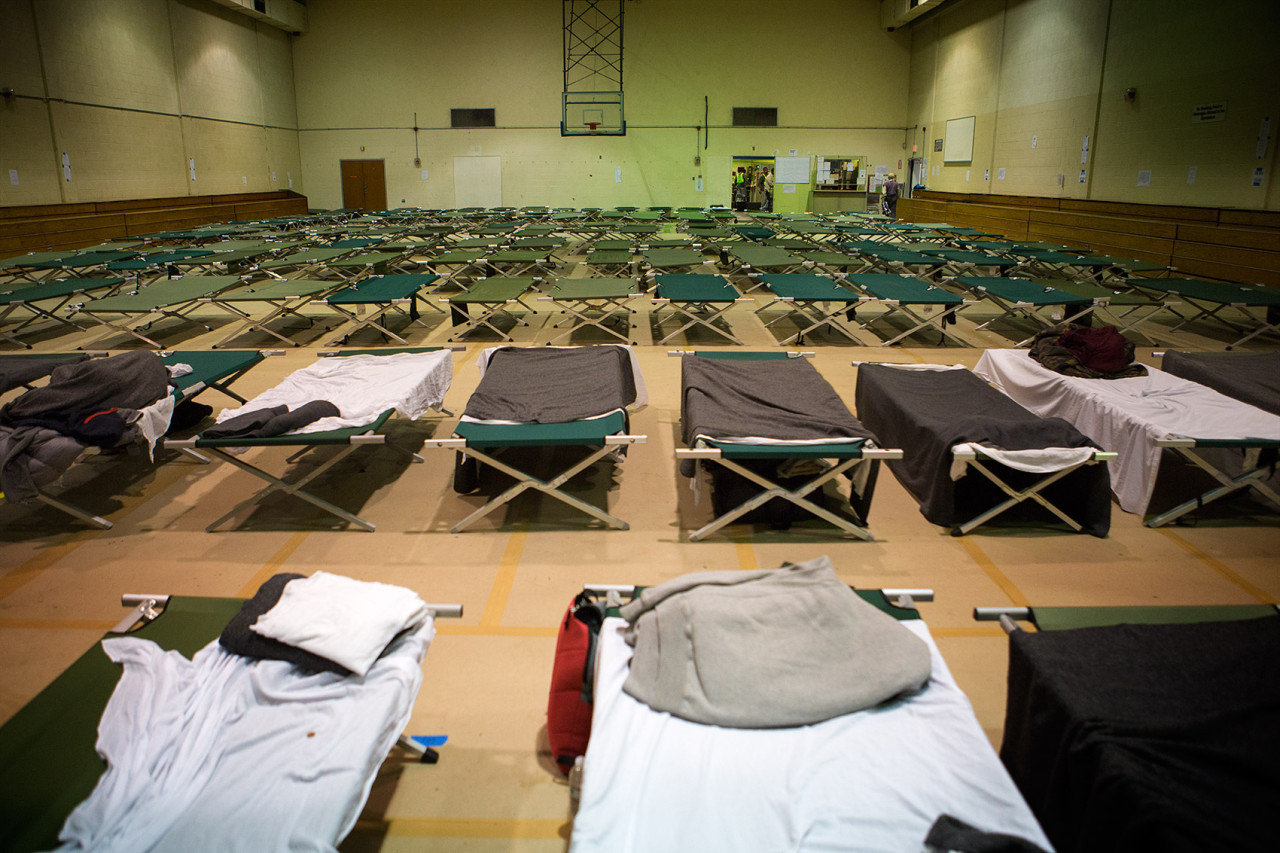
"They are given two sheets and a blanket," Henderson explained. "And there's numbers, actually, on the floor to be able to differentiate kind of where the beds are because there are quite a bit in here."
Unlike at the women's emergency shelter, where Boston Health Care for the Homeless allowed us in during the busy time at night and workers encouraged women there to talk with us, at the men's shelter the health commission would only let us visit at midday, when it was almost empty. Most of the men who were there were in a room off-limits to us, because officials said they didn't want to speak with the media.
The Pine Street Inn cooks and trucks over meals to the makeshift facility, where the men are allowed to stay during the day — but they can't come and go. If they leave, they have to report later in the day to the nearby Woods-Mullen Shelter, to be searched for weapons and drugs and bused back.
Henderson said that well before the Long Island bridge was closed, the health commission designated the fitness center as the emergency shelter should the island shelter shut down. But it was only to be used for four to six weeks. It's already been 10.
Asked if the situation has been difficult, Henderson said shelter staff and guests are doing the best they can and adapting well.
"I mean, it's an emergency shelter," she said. "And so this was the plan that we had put in place. So we're very excited that it's come out that we have a new place that we're going to be going. But for right now this is what we have."
Some of the men we spoke with say the bathrooms aren't sanitary — and there are not enough toilets.
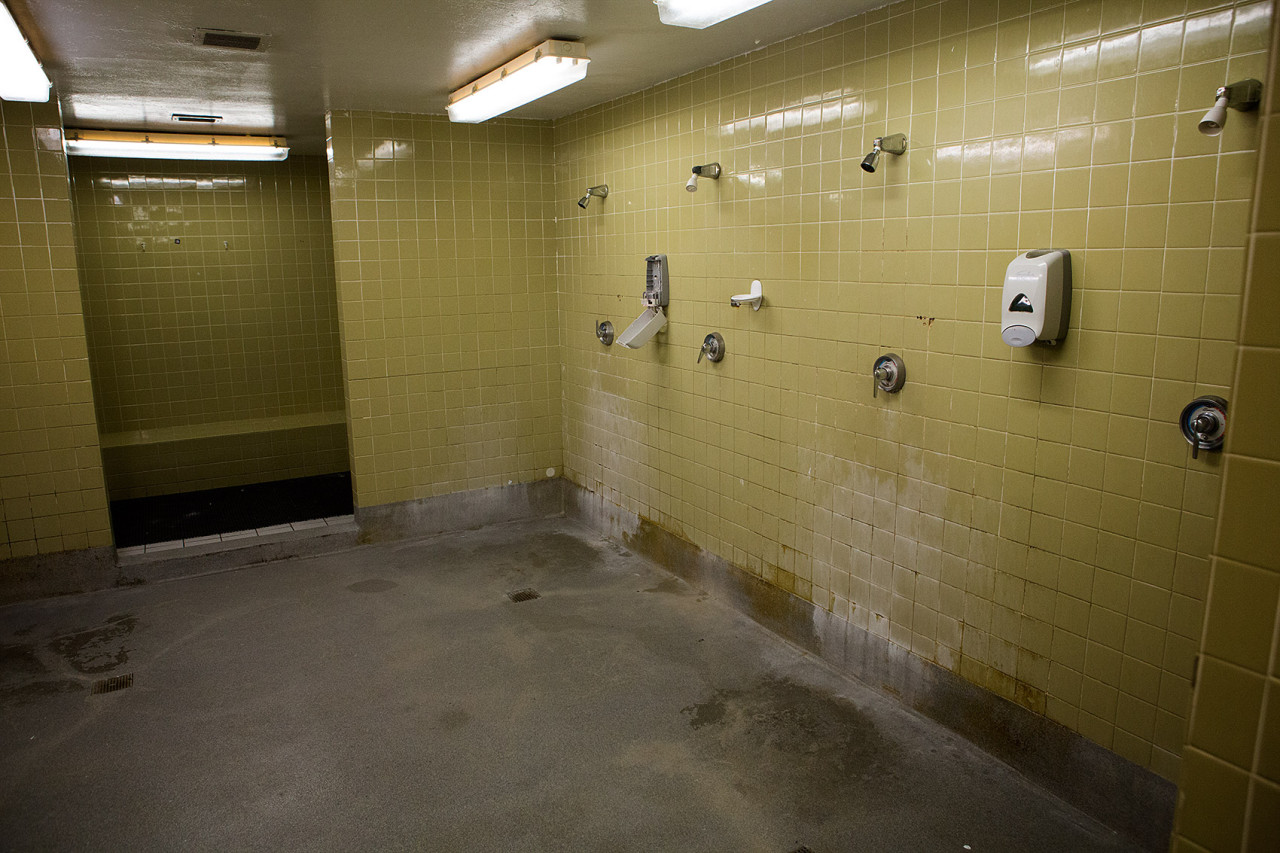
Henderson showed us three bathrooms with a total of six toilets, two urinals and one communal shower with six shower heads for 250 men. The bathrooms were old and moldy in places, but there was a heavy smell of disinfectant in the air.
Fifty-eight-year-old Cleve Rae, one of the shelter's residents, said using the bathroom facilities is "very off-putting," and as a result he's changed his hygiene habits quite a bit.
We met Rae at a coffee shop down the street, where he said he goes every morning — carrying all of his belongings in a backpack.
Rae had a 30-year career as a software developer, he said, until his bipolar disorder became unmanageable. Then for the last six years he worked odd jobs, until he couldn't because of his mental illness.
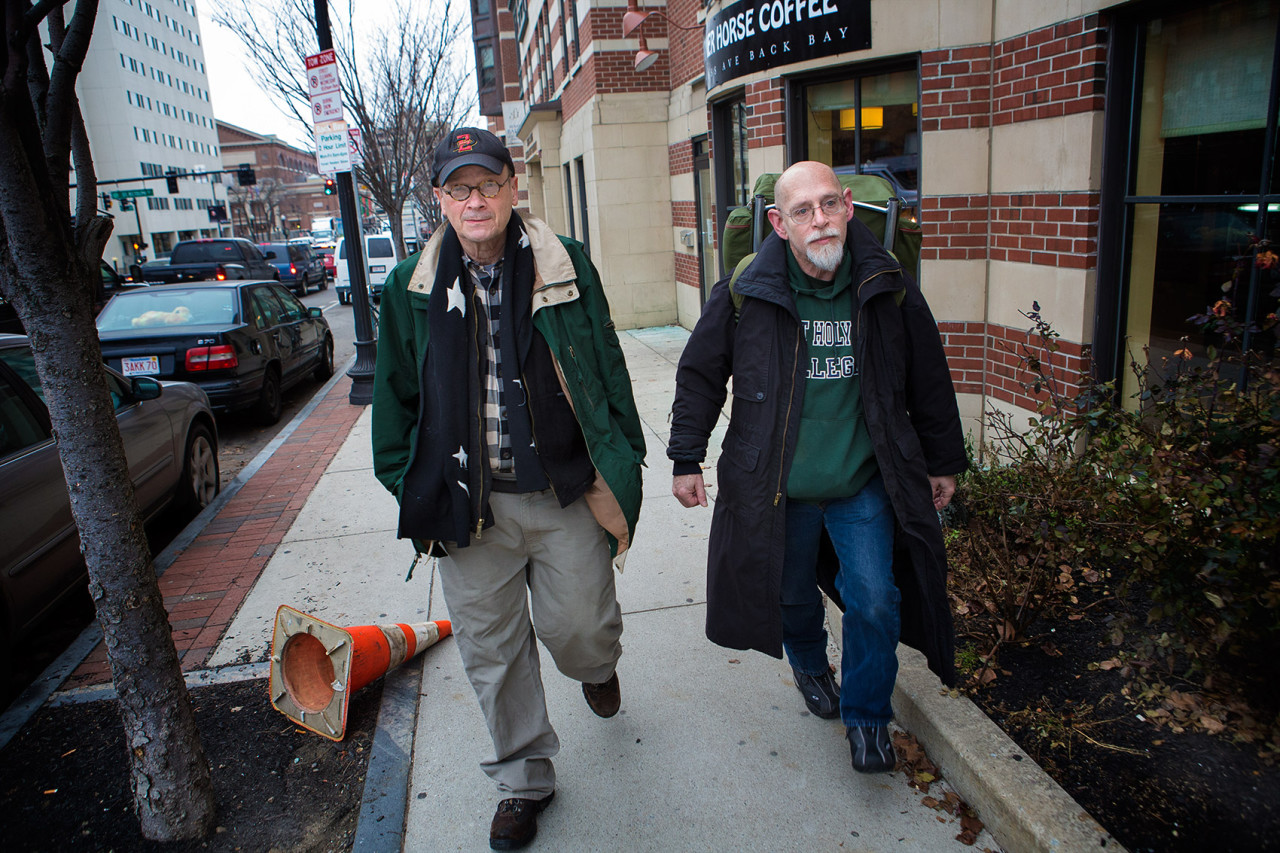
After a month in a psychiatric hospital ended in early October, Rae had nowhere to go. His therapist recommended the Long Island shelter. So he went. Five days later, the bridge closed and the residents had just a few hours to leave.
"The lack of stability has not helped at all. All of the guys in the shelter have one form or another of mental illness," Rae said. "And having services available when you need it is very important."
Rae has applied for public benefits and hopes to get into a Boston Housing Authority apartment. He and others work on a committee that pushes for improved shelter conditions and more programs for the homeless. Rae said his meetings with city officials so far have made him optimistic that people will get out of the makeshift shelters as soon as possible.
This segment aired on December 18, 2014.

